Case Study (lactate)
1/34
There's no tags or description
Looks like no tags are added yet.
Name | Mastery | Learn | Test | Matching | Spaced |
|---|
No study sessions yet.
35 Terms
Why does glucose uptake by a skeletal muscle cell require transporter such as GLUT4? In other words, why isn't simple diffusion possible
Glucose is large and polar
What stimulates the insertion of GLUT4 into the sarcolemma?
insulin dependent; exercise dependent (Skeletal muscle contraction)
The existence of GLUT4 in the sarcolemma does not guarantee glucose uptake into the cell. Why? what else is required?
concentration gradient
Exercise helps reduce blood glucose levels in people, even if their insulin resistant unless their cells can no longer respond to insulin efficiently. how is this possible
exercise specific
exercise at a submaximal level flow chart
glucose released from liver
blood glucose levels decrease
insertion of GLUTs into sarcolemma
diffusion of glucose into cells
Skeletal muscles also use glycogen but they use it right away so it doesn't get released into the bloodstream
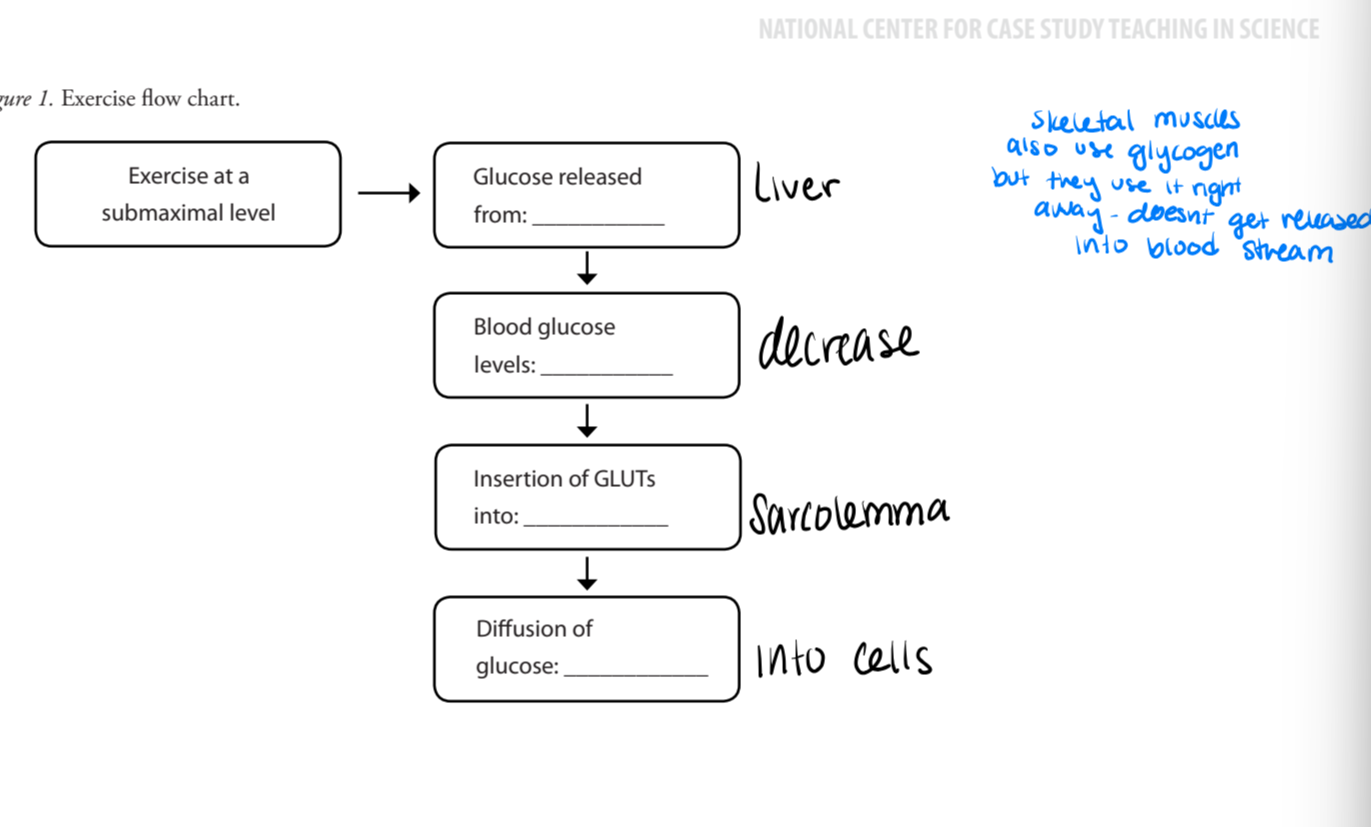
Portion of skeletal muscles cells sarcolemma during exercise
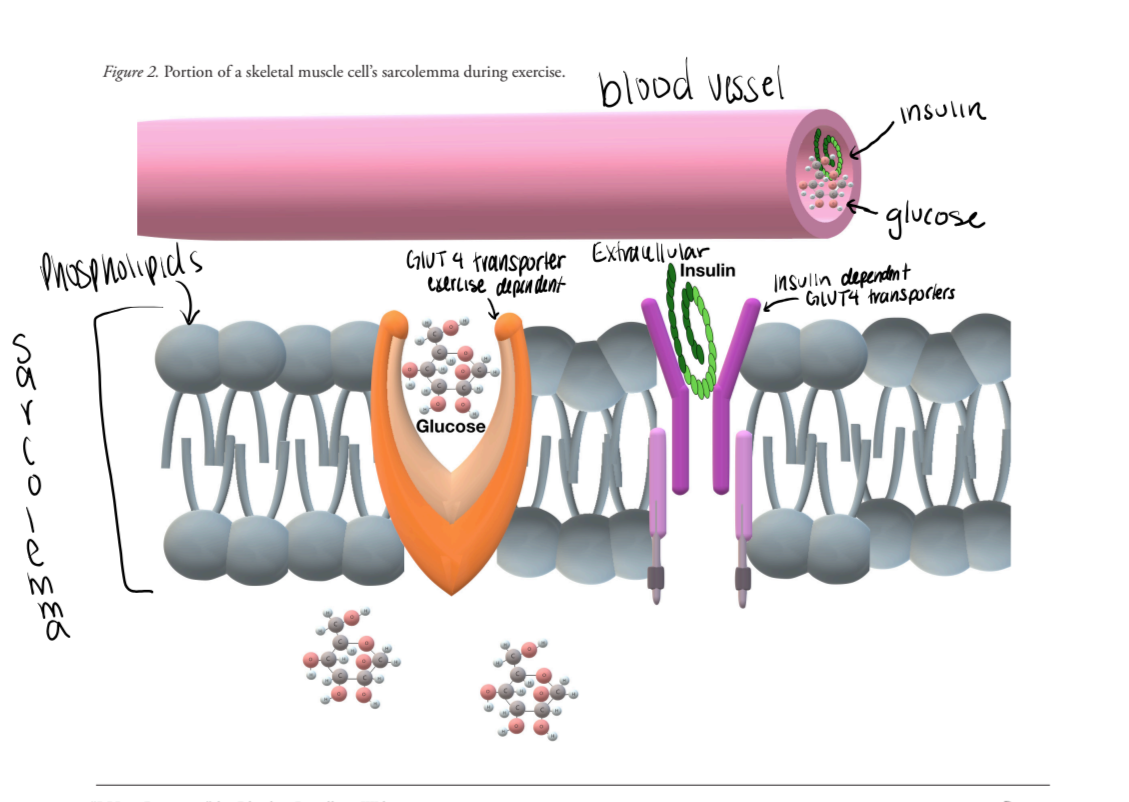
glucose to lactate
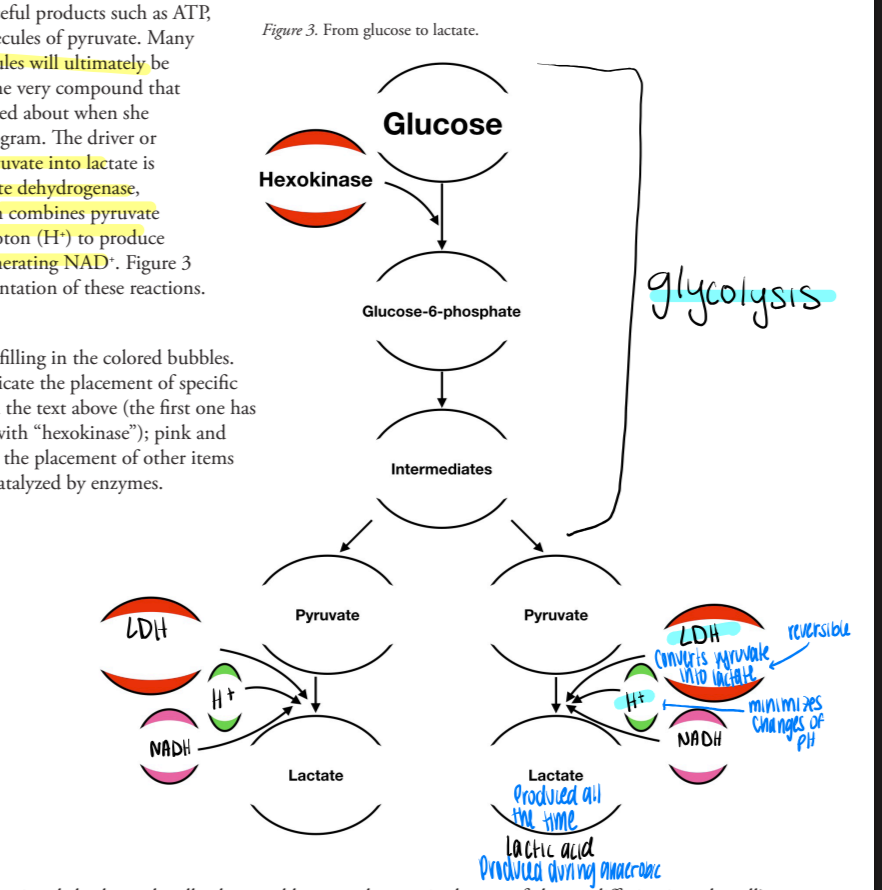
LDH
Converts pyruvate into lactate
reversible
H+
Minimizes changes of ph
lactate
produced all the time
lactic acid
Produced during anaerobic respiration
in an actively contracting skeletal muscle cell what would cause a decrease in the rate of glucose diffusion into this cell
if GLUT4 is saturated; # of transporters- Can only transport one glucose at a time- if GLUT4 is saturated wont work
change in concentration gradient
In order to produce lactate from pyruvate what items or inputs are required
LDH, H+, NADH
From pyruvate to lactate
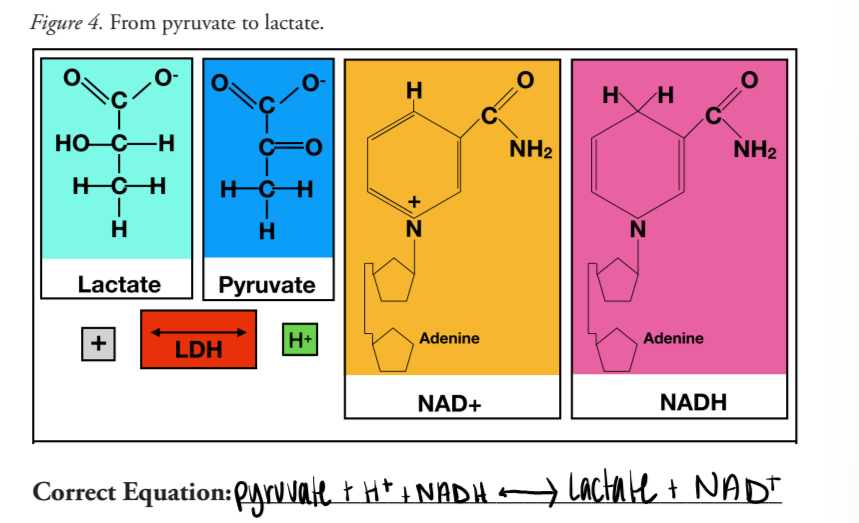
During glycolysis 1 molecule of glucose which has six carbons is split into two molecules of pyruvate which has three carbons each. Each pyruvate molecule can then be converted into a molecule of lactate which also has three carbons. Oxygen is not required for any of these processes to occur why
no carbon dioxide is produced
no change (decrease) in total number of carbons
After a lactate is produced in the sarcoplasm where might it go and how might it be used
into mitochondria; exits cell
mitochondria Can convert lactate into pyruvate
when exiting the cell it is cotransported with H+ ions- the H+ ions become the issue
How does the production of lactate protect or buffer the cell from acidosis which is defined as the accumulation of H + in a fluid filled compartment
picks up 2H+
Look at the structure of lactate. Do you think it can leave the cells via simple diffusion? Why or why not
polar; relatively large
the 3 fates of lactate
exit cell via MCT
mitochondria
converted to pyruvate
The fates of lactate diagram
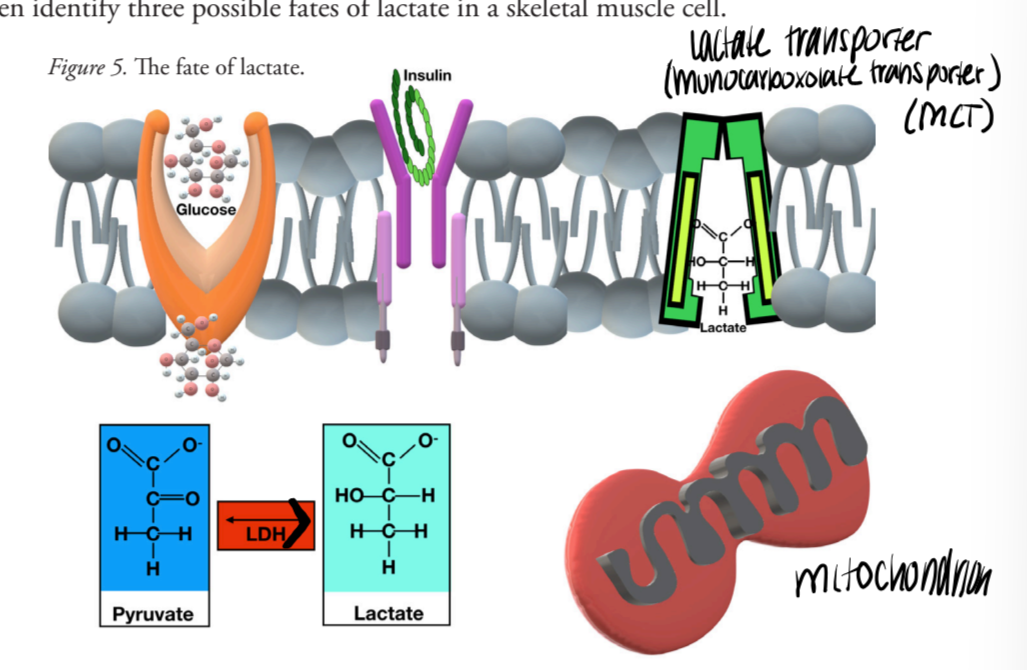
If lactate is an energy source for the cell in which it is produced, why does it spill into the blood in other words why to blood lactate levels increase during exercise especially in untrained people
production>utilization
Lactate is not the problem H+ Co transported is
LDH is an enzyme and thus a protein. in order for a skeletal muscle cell to increase the amount of LDH within the sarcoplasm, what cellular processes must be completed? what organelles need to be added to figure in order for LDH to be produced?
increased protein synthesis= more copies of enzyme LDH
Lactate threshold test results
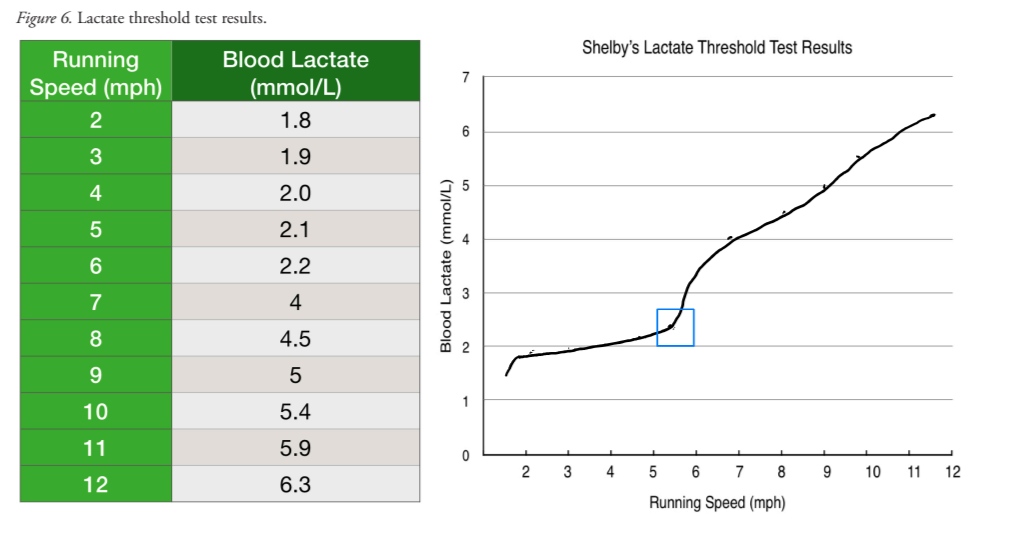
Through dedicated training, the speeder level of effort coinciding with a persons lactate threshold improves. Within the skeletal muscle cell what changes might have occurred to permit this improved lactate threshold resulting in less lactate spilling owl into the blood
more LDH enzyme (synthesis)
more mitochondria
Changes in the extracellular fluid and blood flow chart
Items diffusing from the muscle cell are lactate and H+
lactate is used by other organs like the heart
H+ cotransports and causes problems
Transporter used during diffusion is MCT
Location of transporter in the muscle cell is in the sarcolemma
Impact on ECF and blood pH: decrease- H+ added (lactic acid)
MCT and facilitated diffusion diagram
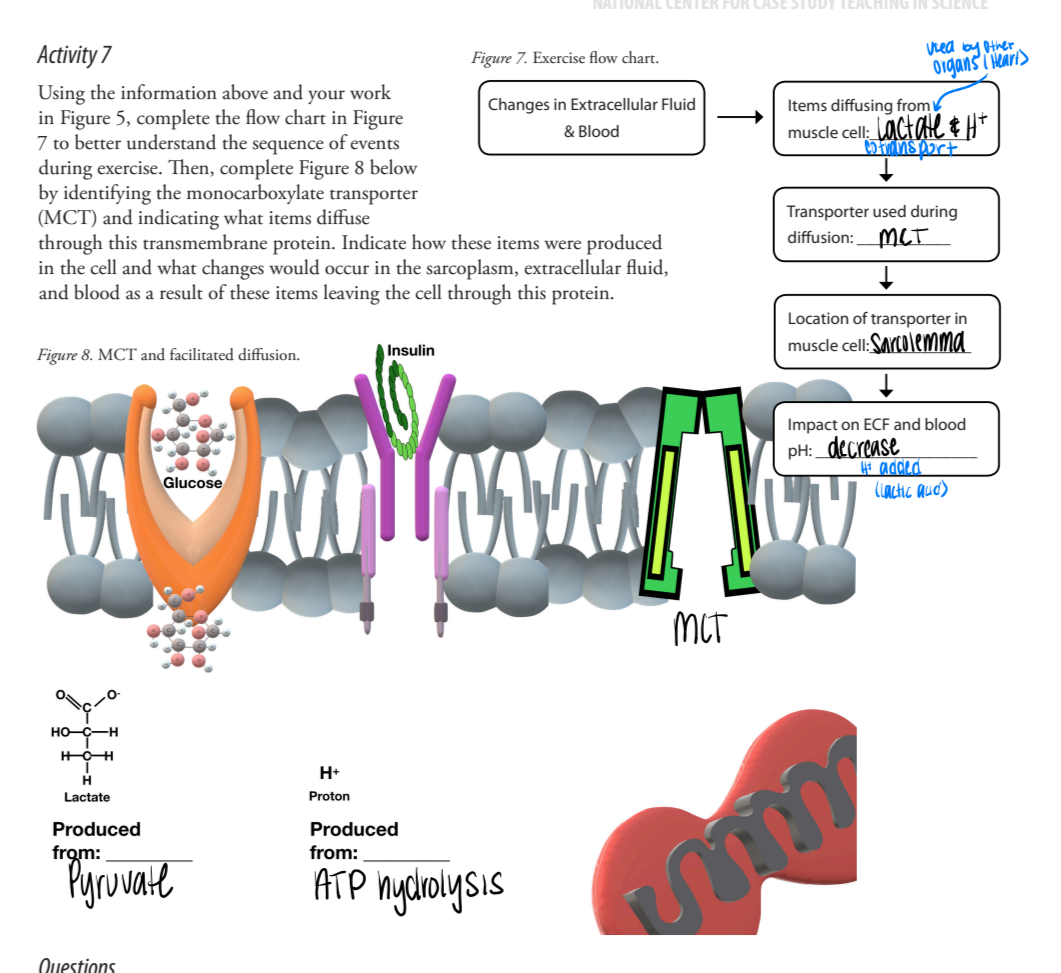
Lactate
produced from pyruvate
H+ proton
produced from ATP hydrolysis
Suppose you are measuring changes in blood composition in real time in an untrained person like Shelby who is jogging a moderate pace on a treadmill and you noticed that as lactate levels increase in her blood so do H+ levels why is this is lactate the original source of these additional H+ ions
Lactate co transports with H+
Hypothesize how Shelby's lactate threshold rest would change with dedicated aerobic training. What changes would occur within skeletal muscle cells to delay the spilling of lactate into the blood
more LDH (enzyme) and more mitochondria= raise lactate threshold
lactic acid
produced during anaerobic respiration
proton donor- produces protons
decreases pH in sarcoplasm
lactate
produced during aerobic respiration
proton acceptor (remo
Skim back through this case study and identify the causes of H+ production and accumulation in the sarcoplasm, extracellular fluid, and blood. Is lactate ever the original source of these ions were just guilty by association? Then go back to the very first page of this case study and re examine your thoughts from activity one can you generate a more detailed list of misconceptions now
H+ originate from ATP hydrolysis and NADH
lactate is not the cause- guilty by association
What is the relationship between the production of lactate and the burning sensation many people like Shelby described after they begin a new exercise regimen or activity how is the brain made aware of this situation
H+ stimulate pain receptors
Hypothesize what changes could occur within skeletal muscle cells that would help prevent the burning sensation after completing an aerobic exercise activity like jogging
increased LDH (enzyme) and increased mitochondria